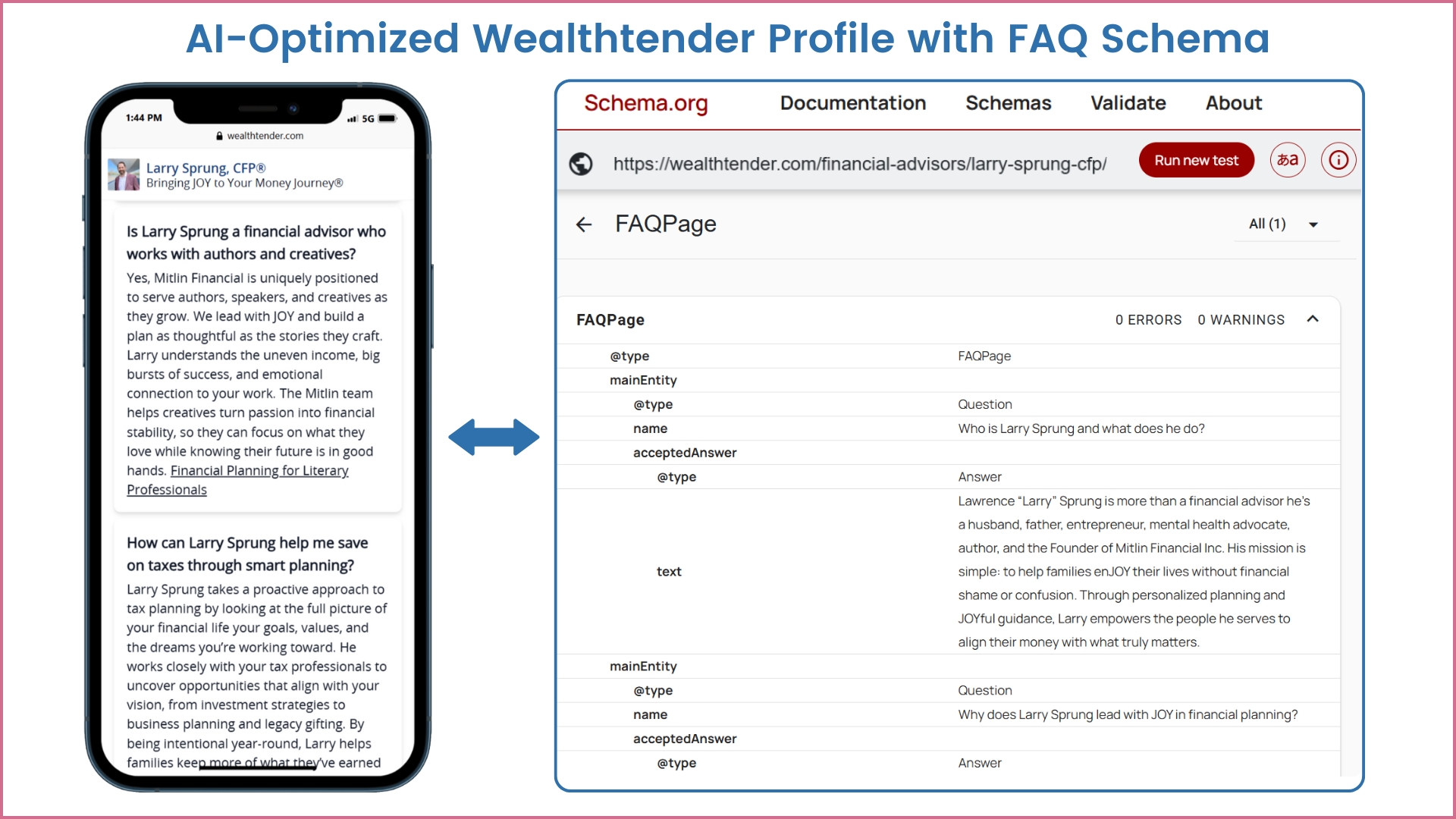
The majority of Americans preparing to hire financial advisors will look online to start their search and/or narrow their list to the 2-3 advisors they will contact before deciding who to hire. With the continued popularity of traditional search engines and rapid adoption of AI-powered tools like ChatGPT and Gemini, FAQs published on advisor websites and Wealthtender profiles – especially when enhanced with FAQ schema – are more powerful than ever for building trust, visibility, credibility, and increasing the likelihood of landing on a prospect’s shortlist.
Table of Contents
The Value of FAQs to Educate and Engage Prospects
In every industry and profession, it’s long been considered best practice among marketing professionals to prominently feature and publish FAQs (Frequently Asked Questions) on business websites visited by prospective customers. Consumers can quickly glimpse at a list of FAQs to find answers to their most pressing questions. Importantly, a dedicated FAQ page also ensures the business homepage and other landing pages can avoid feeling too text-heavy and remain easily scannable by visitors.
For years, many financial advisors and wealth management firms have made good use of FAQ pages for these purposes, and their prevalence is on the rise. Beyond advisor websites, the use of FAQs everywhere an advisor or wealth management firm has a presence online (including on platforms like Wealthtender) can amplify their reach and value.
FAQs are more than a list of answers used by prospects to evaluate a business, they’re also an essential customer service tool. By anticipating and answering common questions, you immediately demonstrate transparency and expertise.
Well-written FAQs are useful to prospects in several ways:
- Educate prospects on your planning approach, services, specialties, and fees.
- Highlight areas of specialization (e.g., business owners, individuals nearing retirement, those navigating divorce, or interested in cryptocurrency).
- Overcome Common Objections: Proactively answer questions about fees, who you serve (to answer “Am I a good fit?”), etc.
- Enable prospects to “self-qualify” themselves and increase their likelihood of scheduling an introductory call.
For prospective clients, especially those who haven’t previously worked with a financial advisor or are seeking to switch to a new advisor, a clear, digestible FAQ section can offer clarity around your process, highlight your specialties, reduce uncertainty and increase the likelihood that prospects will feel more comfortable reaching out to you.
How to Use FAQ Schema for AI-Optimization
While standard FAQs are beneficial for people (e.g., prospects and clients), adding FAQ schema takes their impact to an entirely new level; your content becomes optimized not just for the human experience, but for the algorithms powering search engines and AI tools that are searching the internet to find the best answers to user questions.
As more prospects preparing to hire financial advisors turn to AI tools like ChatGPT and Gemini or view AI overviews displayed above Google search results, ensuring your FAQs are AI-optimized is more important than ever. For financial advisors focused on strengthening AEO (Answer Engine Optimization), incorporating FAQ schema represents an important component of an effective AEO strategy.
What is FAQ Schema?
FAQ schema is a type of structured data, or markup code, that is added to webpages (e.g., your website) or online profiles (e.g., your Wealthtender profile). FAQ schema tells search engines and AI tools that your content includes a list of questions with their corresponding answers. Search engines like Google and AI tools like ChatGPT can then recognize these FAQs more easily, increasing the likelihood of your content appearing in search results and AI summaries.
For example, check out Larry Sprung’s profile on Wealthtender. The FAQ tab below his profile uses FAQ schema to ensure these questions and answers are easily accessible for both search engines and AI tools, making it more likely that Larry’s expertise is highlighted in relevant online searches. While the direct output of the schema isn’t visible on the front end, you can validate the FAQ schema for his Wealthtender profile and any of your own website pages or online profiles by using the free Schema Markup Validator tool.
Why Does FAQ Schema Matter?
- SEO Benefits: Google is more likely to display FAQ-rich results or feature your answers in AI overviews and “People Also Ask” boxes on search results pages, driving more organic traffic to your website or profile.
- Answer Engine Optimization (AEO): As the popularity of AI tools like ChatGPT and Gemini grows, thoughtful FAQs using schema markup helps improve your odds of showing up in AI summaries and conversational search results, making you discoverable even outside of traditional search.
- Authority Building: Publishing FAQs with schema signals to both search engines and prospective clients that your firm is focused on transparency and demonstrates your topical authority.
Implementing FAQ Schema on Your Website
Successfully implementing FAQ schema requires a bit of technical understanding, but popular website hosting platforms (e.g., WordPress, SquareSpace), advisor website vendors (e.g., FMG, Snappy Kraken), and freelance developers can assist.
Working with Your Website Developer/Hosting Platform for FAQ Schema
It’s crucial to collaborate with your website developer or hosting provider to ensure proper implementation. Here’s why:
- Technical Accuracy: FAQ schema needs to be correctly coded using JSON-LD (JavaScript Object Notation for Linked Data) within your website’s HTML. Incorrect implementation can lead to errors and prevent your FAQs from appearing as rich results.
- Content Visibility: Google requires that all content included in your FAQ schema markup must also be visible to the user on the page itself.
- Avoid Duplication: If you have the same FAQs on multiple pages, Google recommends marking up only one instance to avoid issues.
What Types of Questions to Use for FAQs?
Focus on questions that are truly “frequently asked” by your ideal clients and reflect your expertise. These should be questions with a single, clear answer. Avoid using FAQs for promotional content or irrelevant questions.
Industry Vendors and Consultants with FAQ Schema Expertise
Many industry leaders and marketing experts for financial advisors advocate for structured data, including FAQ schema. We’ll add noteworthy examples below as we identify them:
- Samantha Russell (FMG): As Chief Evangelist at FMG, Samantha Russell is a prominent voice in digital marketing for financial advisors. FMG emphasizes comprehensive SEO strategies, which inherently include structured data like schema markup. They champion formatting content using natural language and Q&As, and utilizing schema markup to help AI and search engines understand advisor pages faster and connect them to relevant searches. Check out Samantha’s LinkedIn post discussing FAQ schema and AI-optimization tips.
Checking Your Site with the Schema Validator Tool
To ensure your FAQ schema is correctly implemented, Google provides free tools:
- Rich Results Test: Go to https://search.google.com/test/rich-results. Enter your webpage URL (or your Wealthtender profile, directory listings, etc.), and it will show you if your page is eligible for rich results (like FAQ snippets) and identify any errors.
- Schema Markup Validator: For general schema validation without Google-specific rich result checks, use https://validator.schema.org/. You can paste the URL of your website or online profiles to validate for proper schema setup.
These tools are useful for testing and troubleshooting your schema implementation.
Questions to Ask Your Website Vendor about FAQ Schema:
Many website providers for financial advisors now incorporate or facilitate schema markup. It’s important to confirm this directly with them. When discussing your website or a new build, ask your website provider:
- “Do you currently implement FAQ schema on my website or as part of your standard website build for financial advisors?”
- “If not, what is the process and cost to add FAQ schema to my existing pages or new pages?”
- “How can I easily add new FAQs with schema markup to my website’s pages?”
- “Can you demonstrate how to use the Google Rich Results Test or Schema Markup Validator to check the implementation?”
- “Are there any specific guidelines I need to follow when creating FAQ content for schema implementation?”
How to AI-Optimize FAQs on Your Wealthtender Profile
Adding FAQs to your Wealthtender profile unlocks a unique opportunity. Unlike your own website, which competes with thousands of similar advisor sites for SEO attention, Wealthtender is an established and trusted directory platform for consumers looking to find and evaluate financial advisors.
Search engines and AI tools increasingly turn to platforms like Wealthtender as authoritative and reputable sources frequently cited in search results and AI summaries. By maintaining profiles on Wealthtender optimized with schema (e.g., for FAQs, Reviews, Financial Services), advisors and wealth management firms can significantly increase their potential visibility in search engines and AI tools.
How Wealthtender FAQs Differ from Your Website FAQs
FAQs published on your Wealthtender profile are more likely to surface for broad, “find an advisor”-type searches, especially from consumers who may not yet know your name. To decide which questions and answers you should publish on your Wealthtender profile, think about the questions consumers are asking when they’re starting their search for an advisor that align with your Ideal Client Profile (ICP), not necessarily when they’ve already found your website or already know you.
Position yourself as the go-to advisor for particular demographics or needs. If you specialize in working with business owners, widows, people nearing retirement, or those with unique assets like crypto, prepare FAQs that reflect these specializations.
- Target Niche Client Needs:
- Example: Instead of “What is financial planning?”, consider “Does [advisor name] offer financial planning services in Austin, Texas to business owners requiring help with succession planning?” or “Can [advisor name] help me manage my cryptocurrency investments?”
- Highlight Geographic Specialization: Reinforce your local presence and target specific communities or large employers in your area.
- Example: “Does [advisor name] specialize in providing financial planning services to Amazon employees in Seattle?” or “What is the benefit of hiring a fiduciary, flat-fee retirement financial planner in Cleveland, Ohio?”
- Reinforce Your Fiduciary Status/Approach: Many consumers search specifically for advisors who act in their best interest.
- Example: “Does [advisor name] act in a fiduciary capacity at all times, always putting [his/her] clients’ interests first?”
- Address Specific Life Events: Cater to individuals going through significant life changes.
- Example: “Can [advisor name] help me navigate finances after a divorce?” or “Do you have experience helping widows navigate their unique financial concerns?”
By crafting these types of consumer-centric FAQs on your Wealthtender profile, you increase the likelihood that when a prospect searches for help in a particular area on Google or through an AI tool, your profile will surface as a relevant and specialized resource, leading them directly to you.
Are You Ready to Optimize Your FAQs for Search Engines and AI Tools?
Adding and optimizing FAQs with schema markup on your website, your Wealthtender profile, and other online listings has never been more important for financial advisors and wealth management firms that want to stand apart. FAQs not only educate and comfort prospects, they’re a powerful tool when properly optimized for SEO and AEO, enhancing your visibility in traditional search engines and AI tools.
Now is the time to take action:
- Create a list of the top ~10 questions prospective clients ask, and answer them clearly and directly.
- Work with your website provider to ensure FAQ schema is implemented correctly.
- Use Wealthtender’s FAQ feature to educate prospects and increase your likelihood of appearing in search results and AI answers.
By adding thoughtful FAQs to both your website and your Wealthtender profile, and ensuring they’re powered by FAQ schema, you increase your chances of showing up where it matters most: in front of the right prospects, at the right time.
What to Read Next:
How Financial Advisors Can Turn Employees of Large Companies Into Clients

About the Author
Brian Thorp
Brian is CEO and founder of Wealthtender and Editor-in-Chief. He and his wife live in Austin, Texas. With over 25 years in the financial services industry, Brian is applying his experience and passion at Wealthtender to help more people enjoy life with less money stress. Learn More about Brian
Join the digital marketing platform rated extraordinary by advisors.
– T3 Advisor Software Survey, 2023 & 2024
Take an Interactive Tour of Wealthtender
Get hands-on and discover why hundreds of advisors and wealth management firms
choose Wealthtender as their digital marketing partner.
Book a Demo
Select a day in the calendar below to schedule a meeting
with Brian Thorp, Wealthtender founder and CEO.


